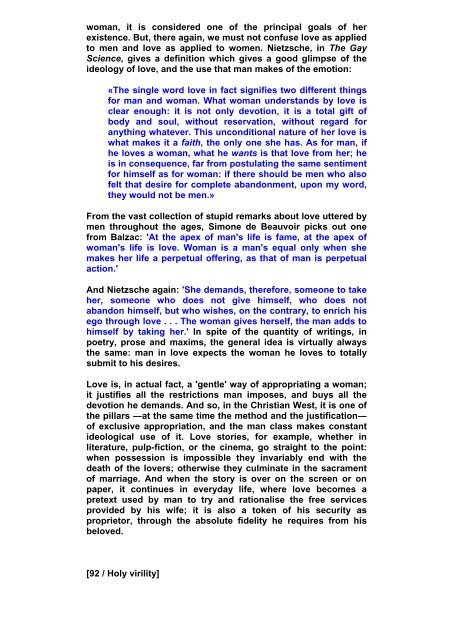emmanuel reynaud holy virility the social construction of masculinity
emmanuel reynaud holy virility the social construction of masculinity
emmanuel reynaud holy virility the social construction of masculinity
Create successful ePaper yourself
Turn your PDF publications into a flip-book with our unique Google optimized e-Paper software.
woman, it is considered one <strong>of</strong> <strong>the</strong> principal goals <strong>of</strong> her<br />
existence. But, <strong>the</strong>re again, we must not confuse love as applied<br />
to men and love as applied to women. Nietzsche, in The Gay<br />
Science, gives a definition which gives a good glimpse <strong>of</strong> <strong>the</strong><br />
ideology <strong>of</strong> love, and <strong>the</strong> use that man makes <strong>of</strong> <strong>the</strong> emotion:<br />
«The single word love in fact signifies two different things<br />
for man and woman. What woman understands by love is<br />
clear enough: it is not only devotion, it is a total gift <strong>of</strong><br />
body and soul, without reservation, without regard for<br />
anything whatever. This unconditional nature <strong>of</strong> her love is<br />
what makes it a faith, <strong>the</strong> only one she has. As for man, if<br />
he loves a woman, what he wants is that love from her; he<br />
is in consequence, far from postulating <strong>the</strong> same sentiment<br />
for himself as for woman: if <strong>the</strong>re should be men who also<br />
felt that desire for complete abandonment, upon my word,<br />
<strong>the</strong>y would not be men.»<br />
From <strong>the</strong> vast collection <strong>of</strong> stupid remarks about love uttered by<br />
men throughout <strong>the</strong> ages, Simone de Beauvoir picks out one<br />
from Balzac: 'At <strong>the</strong> apex <strong>of</strong> man's life is fame, at <strong>the</strong> apex <strong>of</strong><br />
woman's life is love. Woman is a man's equal only when she<br />
makes her life a perpetual <strong>of</strong>fering, as that <strong>of</strong> man is perpetual<br />
action.'<br />
And Nietzsche again: 'She demands, <strong>the</strong>refore, someone to take<br />
her, someone who does not give himself, who does not<br />
abandon himself, but who wishes, on <strong>the</strong> contrary, to enrich his<br />
ego through love . . . The woman gives herself, <strong>the</strong> man adds to<br />
himself by taking her.' In spite <strong>of</strong> <strong>the</strong> quantity <strong>of</strong> writings, in<br />
poetry, prose and maxims, <strong>the</strong> general idea is virtually always<br />
<strong>the</strong> same: man in love expects <strong>the</strong> woman he loves to totally<br />
submit to his desires.<br />
Love is, in actual fact, a 'gentle' way <strong>of</strong> appropriating a woman;<br />
it justifies all <strong>the</strong> restrictions man imposes, and buys all <strong>the</strong><br />
devotion he demands. And so, in <strong>the</strong> Christian West, it is one <strong>of</strong><br />
<strong>the</strong> pillars ―at <strong>the</strong> same time <strong>the</strong> method and <strong>the</strong> justification―<br />
<strong>of</strong> exclusive appropriation, and <strong>the</strong> man class makes constant<br />
ideological use <strong>of</strong> it. Love stories, for example, whe<strong>the</strong>r in<br />
literature, pulp-fiction, or <strong>the</strong> cinema, go straight to <strong>the</strong> point:<br />
when possession is impossible <strong>the</strong>y invariably end with <strong>the</strong><br />
death <strong>of</strong> <strong>the</strong> lovers; o<strong>the</strong>rwise <strong>the</strong>y culminate in <strong>the</strong> sacrament<br />
<strong>of</strong> marriage. And when <strong>the</strong> story is over on <strong>the</strong> screen or on<br />
paper, it continues in everyday life, where love becomes a<br />
pretext used by man to try and rationalise <strong>the</strong> free services<br />
provided by his wife; it is also a token <strong>of</strong> his security as<br />
proprietor, through <strong>the</strong> absolute fidelity he requires from his<br />
beloved.<br />
[92 / Holy <strong>virility</strong>]
















